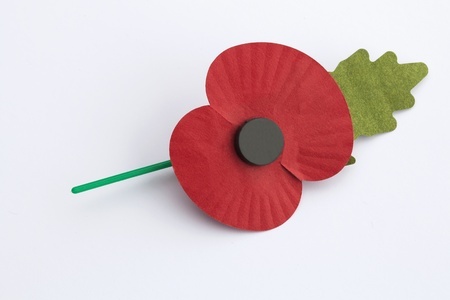Do you wear a poppy? Did you ever consider your reasons as to why or why not wear one? My earliest memory of poppies go back to school where I'd jump at the chance to avoid lessons to visit other classrooms offering the tray of paper flowers, hopefully co-joined by a good buddy or two.
Then years pass and history becomes meaningful. Moving through the decades to parenthood, teaching war poetry to student troops, watching the news irrevocably filled with conflict and death; my views about wearing the poppy changed. It seemed irrelevant that I had no family members who had lost their lives or were serving in the armed forces, as far as I knew, I felt that people had died in wars that were defending the country I had been born, educated, lived, worked and was raising my family in.
Maybe it was teaching and discussing the poetry of Wilfred Owen or novels such as Private Peaceful with classes of diverse students that enabled me to realise the importance of understanding how these wars affected families. I pointed out the weary war memorials we blindly walk past in our home-towns bear the names of real people who died real deaths in a real war. We explored the tale of young men who signed up for service years before they were legally allowed in order to do their duty; which then in turn opened a discussion for what duty means and entails. In this time of 'holy' wars it's imperative we understand what drives a person to kill for their beliefs - even if we don't agree.
Amidst youthful protestations of 'it was their choice' or 'English soldiers should defend England' and a sense of apathy about these wars, I explained conscription and which countries were part of the Empire, meaning that men and women from far-flung nations were also in service. I don't romanticise their involvement and clearly by the fact that most media images of this time erase Indian, African or Caribbean soldiers, it's obvious that they were not given equal status to white soldiers despite dying on the same battlefields. I have read an account of a Grenadian officer during WW1 being refused permission to command his own troops after the voyage overseas purely because of his colour - he could remain in charge only on the ship but not on land as white soldiers would not accept themselves as a subordinate to a man of colour. Or the recounts of soldiers in British West Indies Regiment being mistreated and ignored regardless of the service they were providing
In researching a novel set in the Caribbean I came across an old Ministry of Information video entitled 'West Indies calling' telling of the Caribbean people actively involved in the Second World War. The crisp-clipped English accents and pristine uniforms place black service men and women alongside their white counterparts working hard and doing their bit for Britain. On a programme about a white supremacist group, their march was proudly led by an aged man wearing his wartime medals with supporters claiming how men like him and served and died in the war. Yes this is true. And each to their own belief. But there were also men not like him who died for this country.
At this time every year, in class, I show clips and images of soldiers of all ages, nationalities and colour to the future generations that need to remember and remonstrate about the wars that have come before us, are still with us now and unfortunately will probably be with us in the future.
I was compelled to write this post when I came across The Royal British Legion's charity poster for this year's poppy campaign featuring a black soldier who had recently served alongside a white soldier from WW1. The message simply evoking how war straddles generations and colour.
So it is my choice to observe the silence and wear a poppy.
This post also appeared on post40bloggers.com : Education
